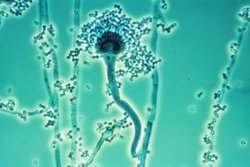Fungal sinusitis
Editor-In-Chief: Prab R Tumpati, MD
Obesity, Sleep & Internal medicine
Founder, WikiMD Wellnesspedia &
W8MD medical weight loss NYC and sleep center NYC
| Fungal sinusitis | |
|---|---|

| |
| Synonyms | Fungal rhinosinusitis |
| Pronounce | N/A |
| Specialty | N/A |
| Symptoms | Nasal congestion, facial pain, headache, fever, nasal discharge |
| Complications | Orbital cellulitis, intracranial complications, bone erosion |
| Onset | Varies depending on type (acute or chronic) |
| Duration | Can be acute or chronic |
| Types | Allergic fungal sinusitis, chronic indolent sinusitis, fungal ball, acute invasive fungal sinusitis |
| Causes | Fungal infection by species such as Aspergillus, Mucor, Rhizopus |
| Risks | Immunocompromised state, diabetes mellitus, chronic sinusitis |
| Diagnosis | CT scan, MRI, nasal endoscopy, biopsy |
| Differential diagnosis | Bacterial sinusitis, viral sinusitis, nasal polyps |
| Prevention | N/A |
| Treatment | Antifungal medication, surgery, corticosteroids |
| Medication | Amphotericin B, voriconazole, itraconazole |
| Prognosis | Varies; better with early diagnosis and treatment |
| Frequency | Rare, but more common in immunocompromised individuals |
| Deaths | N/A |
Fungal sinusitis is a condition characterized by the inflammation of the sinus lining due to a fungal infection. It is a relatively uncommon form of sinusitis and can be classified into two main categories: invasive and non-invasive. Invasive fungal sinusitis is a serious condition that typically affects individuals with weakened immune systems, such as those with diabetes mellitus, cancer, or HIV/AIDS. Non-invasive fungal sinusitis, on the other hand, generally occurs in individuals with normal immune systems and is further divided into allergic fungal sinusitis (AFS) and fungal ball.
Causes and Risk Factors[edit | edit source]
Fungal sinusitis is caused by the inhalation of fungal spores, which can then infect the sinus cavities. The most common fungi associated with this condition include species from the genera Aspergillus, Fusarium, and Mucor. Risk factors for developing fungal sinusitis include a weakened immune system, living in environments with high levels of fungal spores, previous sinus surgery, and the use of immunosuppressive medications.
Symptoms[edit | edit source]
Symptoms of fungal sinusitis can vary depending on the type of infection but generally include chronic nasal congestion, nasal discharge (which may be thick and contain black material in cases of invasive fungal sinusitis), facial pain or pressure, reduced sense of smell, and headaches. In severe cases of invasive fungal sinusitis, symptoms may also include fever, eye swelling, and vision changes.
Diagnosis[edit | edit source]
Diagnosis of fungal sinusitis involves a combination of medical history, physical examination, imaging studies such as CT scans or MRI, and laboratory tests. Nasal endoscopy may be performed to obtain samples for fungal cultures and histopathological examination. Identifying the specific type of fungus is crucial for determining the appropriate treatment plan.
Treatment[edit | edit source]
Treatment for fungal sinusitis depends on the type and severity of the infection. Non-invasive forms, such as allergic fungal sinusitis and fungal ball, are typically treated with surgery to remove the fungal mass and antifungal medications. Invasive fungal sinusitis requires aggressive treatment with intravenous antifungal medications and, in some cases, surgery to remove infected tissue. Long-term management may include the use of oral antifungal medications to prevent recurrence.
Prevention[edit | edit source]
Preventive measures for fungal sinusitis include avoiding environments with high concentrations of fungal spores, such as compost piles and moldy spaces. Individuals with weakened immune systems should take additional precautions, such as wearing masks in potentially contaminated areas and ensuring that indoor air is clean and well-filtered.
Gallery[edit | edit source]
See Also[edit | edit source]
References[edit | edit source]
Search WikiMD
Ad.Tired of being Overweight? Try W8MD's physician weight loss program.
Semaglutide (Ozempic / Wegovy and Tirzepatide (Mounjaro / Zepbound) available.
Advertise on WikiMD
|
WikiMD's Wellness Encyclopedia |
| Let Food Be Thy Medicine Medicine Thy Food - Hippocrates |
Translate this page: - East Asian
中文,
日本,
한국어,
South Asian
हिन्दी,
தமிழ்,
తెలుగు,
Urdu,
ಕನ್ನಡ,
Southeast Asian
Indonesian,
Vietnamese,
Thai,
မြန်မာဘာသာ,
বাংলা
European
español,
Deutsch,
français,
Greek,
português do Brasil,
polski,
română,
русский,
Nederlands,
norsk,
svenska,
suomi,
Italian
Middle Eastern & African
عربى,
Turkish,
Persian,
Hebrew,
Afrikaans,
isiZulu,
Kiswahili,
Other
Bulgarian,
Hungarian,
Czech,
Swedish,
മലയാളം,
मराठी,
ਪੰਜਾਬੀ,
ગુજરાતી,
Portuguese,
Ukrainian
Medical Disclaimer: WikiMD is not a substitute for professional medical advice. The information on WikiMD is provided as an information resource only, may be incorrect, outdated or misleading, and is not to be used or relied on for any diagnostic or treatment purposes. Please consult your health care provider before making any healthcare decisions or for guidance about a specific medical condition. WikiMD expressly disclaims responsibility, and shall have no liability, for any damages, loss, injury, or liability whatsoever suffered as a result of your reliance on the information contained in this site. By visiting this site you agree to the foregoing terms and conditions, which may from time to time be changed or supplemented by WikiMD. If you do not agree to the foregoing terms and conditions, you should not enter or use this site. See full disclaimer.
Credits:Most images are courtesy of Wikimedia commons, and templates, categories Wikipedia, licensed under CC BY SA or similar.
Contributors: Prab R. Tumpati, MD



